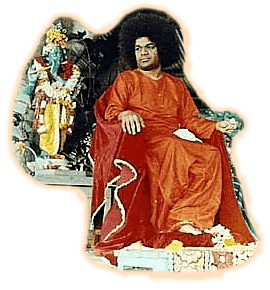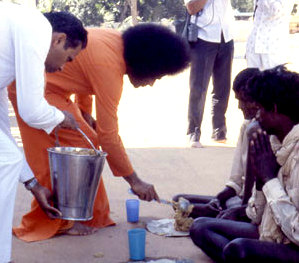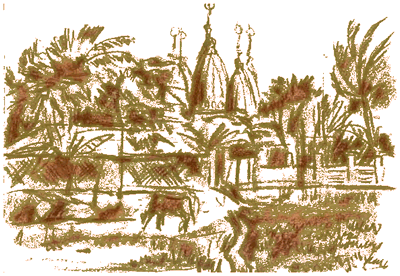|
Other Baba-books
|
||||||||
 |
The original
Sanskrit verses and with comments taken from the writings of
|
|||||||
|
'Faith evolves
according to everyone's nature, o son of Bharata; 1 2a 2b 3 4 5 6 7 8 9 10 11 12 13 14 15 16 17 18a 18b
" Listen to this spoken
chapter in Audio " Every sloka in
the Gītā is important. There are seven hundred slokas
in all. A matchbox may contain as many as 50 sticks. But, a single
match is enough to light a lamp for dispelling the darkness of a place.
Similarly, a single sloka from the Gītā is enough to
bring the light of wisdom and dispel the darkness of ignorance. But
without 'sraddha' or perseverance, the Bhagavad Gītā
will remain a sealed book. There is no liberation and spiritual
enlightenment for the slothful. - Summer Showers in Brindavan 1979, p. 28. Sraddha
is earnestness, perseverance, determination, and steadfastness. Sraddha
alone is not enough. It should be strengthened by nissamshaya
or absence of doubt or scepticism. Sraddha and nissamshaya
are the two banks of the stream of life. In other words, spiritual
advancement cannot be achieved without persistence and faith. Ganga,
Yamunā
and
Saraswatī are the three sacred rivers of our country. They
have their source in the Himalayas and flow down to the vast ocean.
They are swift-flowing rivers with strong embankments. If they have no
embankments they will devastate the entire country. A river must have
banks to restrict its flowing water. A man's life is like a stream,
whose banks are sraddha and nissamshaya. Flowing
between these two banks of sraddha and nissamshaya, a
man's life-stream mingles with the vast ocean of anugraha or
divine grace. Perseverance and faith constitute the life-breath of man.
Humanity cannot exist even for a moment without perseverance and faith.
They are the two wheels of the chariot of man's life, which should
proceed towards the unfathomable ocean of God's boundless grace. - Summer Showers in
Brindavan 1979, p. 66. arjuna uvāca "Krishna!
You
say
that the daivic and asuric natures of man are
the consequences of acts and feelings that had impact on the individual
in previous births. Since it is impossible to escape from such impacts,
what is the fate of those who are condemned to carry this burden with
them? Are there any means by which this can be avoided? Or can their
consequences be mitigated? If such exist, please tell me these for I
could save myself thereby." Arjuna asked thus, in order to draw out
from the Lord the remedy for mankind. - Gītā Vahini, p. 218 śrī-bhagavān uvāca Krishna
gave
an
immediate answer. "There is no paucity of means. Listen. There
are three types of gunas: sattvic, rajasic and tamasic. They
are based on the antar-karana, the inner consciousness. That
too is dependent on the intake of food. You are what you feed on; your
activities shape your nature. So at least in this birth, by regulating
food and activity (ahara and vihara), man can overcome
the asuric tendencies that tend to prevail upon him. He can
promote sattvic tendencies through planned self-effort." This
advice was tendered lovingly by the Lord to the eager inquirer, Arjuna.
-
Gītā
Vahini,
p. 218 sattvānurūpā sarvasya Sraddha
(perseverance) is an essential precondition to the acquisition of
spiritual knowledge. Nothing can be accomplished without perseverance,
patience and tenacity of purpose. Students of the present day forego
food and sleep, and cram guidebooks and notes for the mere passing of
their examinations. This way, they do display a fair amount of sraddha
in their secular studies. But, alas, as regards their spiritual
program, they do not exhibit even an iota of sraddha. - Summer Showers in
Brindavan 1979, pp. 139-40 Know
the
splendor
of that Light, and fly unto it, as high as your wings can
lift you - the wings of bhakti and sraddha (devotion
and steadfastness). -
Sathya
Sai
Speaks VII, p. 126 yajante sāttvikā devān Krishna
patted
Arjuna
on the back. He said, "Sattvic listening is
listening to the stories, experiences and messages of sages and saints
who aspired after God and realized Him. Sattvic seeing is
seeing the worshippers of the Lord, seeing the portraits of saints and
sages, attending festivals in temples, etc. Rajasic seeing is
seeing scenes of luxury, pictures of sensuous joy, of pompous
pageantry, of the exhibition of power and status and display of
egoistic authority. Taking delight in the description of sensuous
scenes and incidents, in the demonstration of power and authority, in
the assertion of might and prowess - these are to be classified as rajasic
listening. Others take delight in listening to gruesome adventures,
stories of wicked ogres and vicious deeds. Such are tamasic
individuals. They admire cruelty and terrifying tactics and take
pleasure in keeping such pictures before them. They worship demonic
bloodthirsty gods and they revel in the lore of ghosts and eerie
forces." -
Gītā
Vahini,
p. 223 aśāstra-vihitam
ghoram karshayantah
śarīra-stham āhāras tv api sarvasya "Arjuna!
Food
is
the chief formative force. The soiled mind dulls the brilliance
of moral excellence; how can a muddy lake reflect clearly? The divine
cannot be reflected in the wicked or vicious mind. Food makes man
strong in body; the body is intimately connected with the mind.
Strength of mind depends upon strength of body too. Moral conduct, good
habits, spiritual effort - all depend upon the quality of food;
disease, mental weakness, spiritual slackness - all are produced by
faulty food." "Krishna!" asked Arjuna, "Pray tell me the constituents
of sattvic, rajasic and tamasic food." - Gītā Vahini, p. 219 āyuh-sattva-balārogya- "Arjuna!
Food
to
be sattvic should be capable of strengthening the mind
as well as the body. It should not be too salty, too hot, too bitter,
too sweet or too sour. It should not be taken while steaming hot. Food
that fans the flames of thirst should be avoided. The general principle
is that there should be a limit, a restraint. Food cooked in water
should not be used the next day; it becomes harmful. Even fried
articles should be consumed before they develop unpleasant odors." - Gītā Vahini, p. 219 kathv-amla-lavanāty-ushna "Rajasic
food is the opposite of the sattvic. It is too salty, too
sweet, too hot, too sour, too odorous. Such food excites and
intoxicates." - Gītā Vahini, p. 219 yāta-yāmam
gata-rasam "Listen.
There
are
three 'puritieś to be observed; purity of the provisions;
purity of the vessels in which food is prepared; and purity of the
persons who serve the prepared food. aphalākānkshibhir
yaj˝o Yaj˝ah
means, as you know, sacrifice, thyaga, renunciation. - Sathya Sai Speaks IX, p.
137 Three
processes
go
together in spiritual discipline as laid down by the
sages; yaj˝a, dāna and tapas (renunciation,
charity and selfcontrol). They cannot be partitioned and
particularized. Thus, charity and self-control are integral parts of yaj˝a.
That
is
why yaj˝a is translated as sacrifice, for, the process
of charity or dāna is essential for yaj˝a. Also, tapas, that
is to say, strict regulation of emotions and thought-processes, to
ensure peace and faith. -
Sathya Sai Speaks VIII, pp. 117-8 abhisandhāya
tu
phalam vidhi-hīnam
asrishthānnam deva-dvija-guru-prāj˝a- Tapas
means sādhana, discipline, spiritual exercise.
It is through tapas that the great processes of creation,
preservation and destruction are happening [see for
example S.B. 2.9:6]. Tapas is the cause for the realization of the
Self. That is to say, when the mind, the intellect and the senses are
subjected to tapas or the crucible of disciplinary exercise,
the Self will stand revealed. - Bhagavatha Vahini, ch. 33 (p. 236). The
bodily
tapas again, is five-fold: The first
practice or discipline,i.e. using your body to worship God, or to go
for the darshan of holy men and saints, will enable you to
overcome and shed out the ego in you. Veneration shown to elders and
holy people will vanquish your ego. The "God-thought" drives out other
thoughts that breed ego. One should feel and think, "Oh God, I do not
know, I do not seek any other help but Thine." Such a thought will root
out other thoughts that bind you to the world. The attachment to the
world weakens and snaps off, and attachment to God strengthens. When we
try to visualize the God inherent in all beings and serving them with
veneration as Gods, then only are we entering the path of true service.
This is the bodily tapas. Tapas does not mean running
away into forests and torturing the body. One has to live in the world,
live in the community and do utmost service to promote their well-being. The second
bodily tapas is the external cleansing and internal cleansing.
The external cleanliness means cleanliness of body and also of the
environment (neighborhood). The inner cleanliness means cleanliness of
mind, i.e. purity of thought. One should understand that to the extent
one keeps one's body clean, he will enjoy good health to that extent. The
third type of tapas relating to
the body is the path of truth. Harmony between thought, word and deed
is truth, the pathway of truth. People could shrewdly and by devious
ways pose as engaged in work and put up a show to deceive others. That
is all deceit. It is untruth. Such is not the path of Sai sevaka.
"Look
up
- aim high" -- Let this be your motto always and for ever. The fourth
type of tapas is brahmacārya or celibacy. In true celibacy,
there should be no scope for any bad idea or thought to enter one's
mind ... The inner meaning of brahmacārya is, whatever one may
be doing, his mind should be anchored in God. "To be treading
towards Brahman, mind filled with God-thought, doing whatever work one
does as worship of God, that is real brahmacārya." To cultivate
conviction that God is inherent in everyone is brahmacārya. In
this context only it is said: sarva jīva namaskaram īśvaram
pragacchati -- veneration shown to anyone is veneration shown
to ╬śvara Himself. The
fifth aspect is ahimsā. It is commonly understood that
cruelty shown and harm done to others is himsa. Causing bodily
injury or wounding or hurting the feelings of others is generally
construed as himsa. Ahimsā has a far deeper connotation
and significance. ┬tmā-nigraha is ahimsā. Mastery over
one's own self is ┬tmā-nigraha. Patience and forbearance is ┬tmā-nigraha.
When
one
has cultivated forbearance, has gained mastery over his
senses, that is ahimsā. When one has been able to restrain and
control the senses, he will not think bad thoughts, he will not see
anything bad, he will not utter anything bad. He only sees good; he
thinks always good, no harsh words he utters. Control of tongue
(speaking pleasantly) alone will not do. Vision should be pure and also
the mind (one's thoughts). All the
above five disciplines constitute bodily tapas. - Spirituality in Day to Day
Living, pp. 11-13 anudvega-karam
vākyam The
second
tapas is austerity of speech. The words you speak
should
be suffused with prema. Whatever we utter, it should be
truthful and in harmony with our thoughts (mind). "satyam nasti
parodharmaha" is the Vedic enunciation. There is no truth other
than dharma, but it should be spoken sweetly. One should not
utter something, even though it be truth, that will hurt others. That
is why it is said in the Bhagavad Gītā "anudvega-karam vākyam..."
(Your
words
should not injure the feelings of others ...). Excitedly
you should not talk; nor should your words cause agitation in others.
Your words should be filled with prema and should be good and
for the good of others. No vehemence, no rhetoric, no harshness should
be in your speech. Softness, gentleness, truthfulness and love should
be the characteristics of what you speak. This is what is meant by
austerity of speech. This should characterize whatever we speak and
utter in our day-to-day life, from morning till night. - Spirituality in Day to Day
Living, pp. 13-14 Vocal
tapas too has to be engaged in. Avoid talking too
much; desist from false statements; do not take delight in backbiting
and in scandal-mongering; never speak harshly; speak soft and
sweet;speak with the memory of Mādhava ever in the background of the
mind." - Gītā
Vahini, p. 221 manah-prasādah
saumyatvam śraddhayā
parayā taptam Of
these
three,
physical tapas, mental tapas and vocal tapas,
even
if one is absent, the atmic effulgence (ātmā-jyoti) cannot
radiate light. The lamp, the wick and the oil are all essential for a
light; the body is the lamp; the mind is the oil and the tongue is the
wick. All three must be in good trim. - Gītā Vahini, p. 221 satkāra-māna-pūjārtham mūdha-grāhenātmano
yat dātavyam
iti yad dānam Some
pious
people
consider that acts of charity are also physical tapas.
It is good that they think so. But when doing charity, one has to do so
after pondering over the place, the time and the nature of the
recipient. For example, charities for schools should be given at places
where there are no schools until then; hospitals have to be established
in areas where diseases are rampant; the hunger of people has to be
appeased where famine conditions have been caused by floods or drought.
The nature or condition of the recipient has to be considered while
imparting teaching of dharma and brahma-vidya, and
while doing service of various kinds. The charitable act that removes
from a person the deficiency most harmful to his progress is called sattvic.- Gītā Vahini, p. 221-2 yat tu
pratyupakārārtham Gifts
made
expecting
something in return like fame and publicity, public
esteem and power, or made in a huff or made reluctantly under pressure
- these are to be classed as rajasic. - Gītā Vahini, p. 222 adeśa-kāle
yad dānam Charity
should
be
given with reverence and faith. It should not just be thrown
at the face of the recipient. Nor should it be given to an undeserving
person or at an inopportune moment. Food for the overfed is a burden,
not a boon. Hospitals in places that are inaccessible are as good as
charity thrown away. Such benefitless and wasteful charity is called tamasic. While
engaged
in
dāna or charity, one has to be very vigilant. You
should not scatter it to whomsoever pleads for it; nor can you shower
it on all kinds of places. Be careful that you remember the three types
mentioned by Me and then, do as seems most proper. The gift that you
make must not be for name or fame; it should have no motive of pomp or
publicity; it should be purposeful and useful. In all acts, the sattvic
attitude is best. This attitude must permeate all
things seen, heard and spoken. om-tat-sad
iti nirdeśo Om
summarizes the Vedas and their teachings. Om-tat-sat,
says the Gītā. Tat (that) which sat (is) is
Om, the One. All this is Brahman, the One without a
second. Tat is used to indicate that the objective world is
taken by the senses to be separate and afar; it means "that" and "that"
is always far, and separate. Sat means "is", "the is", "this"!
When you recognize the tat as "is" or sat, it becomes
"this"; it is no longer object, it is subject, and the merging of
object and subject manifests as the Om! - Sathya Sai Speaks VII, p.
455 The
A
U
M of the OM, represents the om tat sat principle, the
"That is the Truth", "I am the Truth", "the Truth is One" principle.
The OM is the everpresent voice within the echo of the divine call,
from the cavity of the heart. Listen to it, be thrilled by it; that is
the inner adoration, of which the external puja or ritual
worship is the outer symbol. With the ego rampant and rambling, how can
the mind be balanced and faith be steady? Contemplate the OM, the
symbol of the inner flame, which shines through the waking hours, the
dream twilight and sleep night. That way you can earn grace abundantly.
-
Sathya Sai Speaks VII, pp. 364-5 tasmād om
ity udāhritya tad ity
anabhisandhāya There
are
two
entities at first: "I" and "You". Tat and tvam, aham
and brahma. But a third, this prakrīti,
has come between, or rather deludes us as being in between ... When "I"
and "you" have united, prakrīti, disappears. Its role is to
reveal the "you" to the "I" that is all. - Sathya Sai Speaks VII, p. 291 sad-bhāve
sādhu-bhāve ca yaj˝e
tapasi dāne ca [to
verse 27] Sat
is the existence principle, the IS that is the basic truth of the
universe. Align with the truth, the sat in you, the sathya on
which
the
mithya is imposed by minds that do not see the
light.
By dwelling on that sat, (satsang) the flame is lit,
light dawns, darkness flees and the sun of realization rises (j˝āna
bhaskara). - Sathya Sai Speaks VII, p.
35 Keep
away
and
afar the mental reactions caused by contact with the external
world. Then, you can become mere existence, sat; that is the
state of the muni (wise or self-realized soul) or the state
beyond the realm of the senses where their fiat does not run. - Prasanthi Vahini, pp. 68-9 You
know
in
the very depths of your being that "you are and will be", that
is the characteristic of sat, existence. All beings have it. - Sathya Sai Speaks IV, p. 211 aśraddhayā
hutam dattam Brahman alone is sat; prakrīti
is a-sat, unreal. Be in this awareness always, that is the
highest sādhana. - Sathya Sai Speaks III, p. 44 Dāna:
non-desiring, charity. Dhana means welfare or riches.
|
||||||||




 "It is not
enough if the provisions are pure and of good quality. They should have
been procured by fair means; no unfair, unjust, untrue earnings should
be used for one's maintenance. These are fouled at the very source. The
source as well as the course and the goal must all be equally pure. The
vessel must be clean, free from tarnish. The person who serves must not
only be clean in dress, but clean in habits, character and conduct. He
should be free from hate, anger, worry and indifference while serving
the dishes; he should be cheerful and fresh. And he must be humble and
full of love. While attending on those who are dining, he should not
allow his mind to dwell on wicked or vicious ideas. Mere physical
cleanliness or charm is no compensation for evil thoughts and habits.
The sadhaka who has to secure concentration has to be careful
about these restrictions. Otherwise, during dhyanam (meditation),
the
subtle
influences of the wicked thoughts of the cook and the
servers will haunt the sadhaka. Care should be taken to have
only virtuous individuals around. Outer charm, professional excellence,
reduced wages - these should not be allowed to prejudice you in favor
of dangerous cooks and attendants. Examine carefully their habits and
their character. The food you eat is such an important constituent of
the physical and mental stuff with which you have to struggle in the
spiritual field. The purity of the mind can be and has to be
supplemented by the purity of the body as well as purity in its
important function, speech. That is the real tapas (penance);
physical, mental and vocal." - Gītā Vahini, p. 220
"It is not
enough if the provisions are pure and of good quality. They should have
been procured by fair means; no unfair, unjust, untrue earnings should
be used for one's maintenance. These are fouled at the very source. The
source as well as the course and the goal must all be equally pure. The
vessel must be clean, free from tarnish. The person who serves must not
only be clean in dress, but clean in habits, character and conduct. He
should be free from hate, anger, worry and indifference while serving
the dishes; he should be cheerful and fresh. And he must be humble and
full of love. While attending on those who are dining, he should not
allow his mind to dwell on wicked or vicious ideas. Mere physical
cleanliness or charm is no compensation for evil thoughts and habits.
The sadhaka who has to secure concentration has to be careful
about these restrictions. Otherwise, during dhyanam (meditation),
the
subtle
influences of the wicked thoughts of the cook and the
servers will haunt the sadhaka. Care should be taken to have
only virtuous individuals around. Outer charm, professional excellence,
reduced wages - these should not be allowed to prejudice you in favor
of dangerous cooks and attendants. Examine carefully their habits and
their character. The food you eat is such an important constituent of
the physical and mental stuff with which you have to struggle in the
spiritual field. The purity of the mind can be and has to be
supplemented by the purity of the body as well as purity in its
important function, speech. That is the real tapas (penance);
physical, mental and vocal." - Gītā Vahini, p. 220
